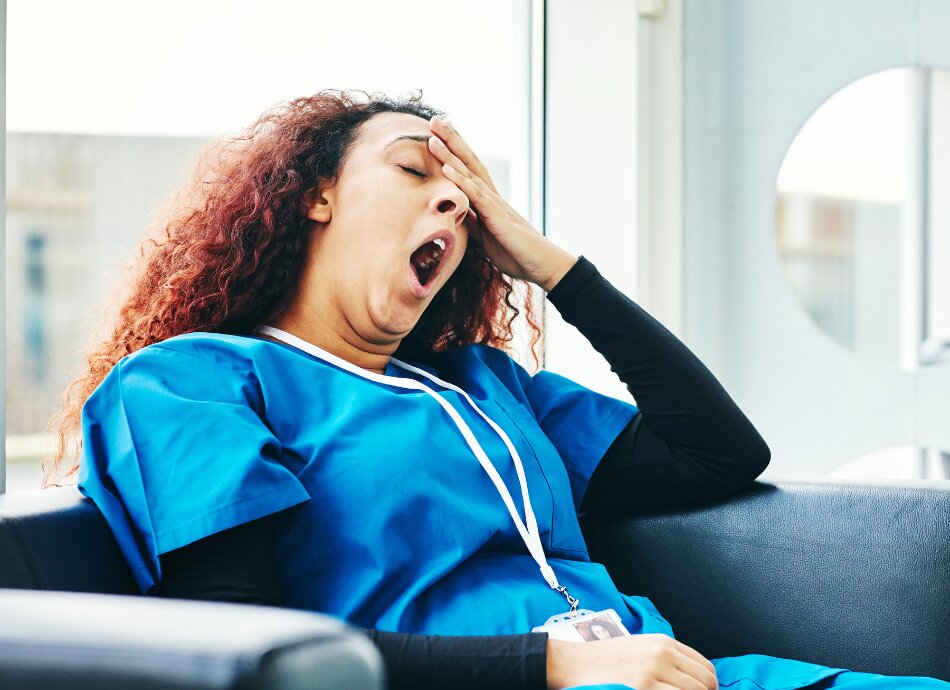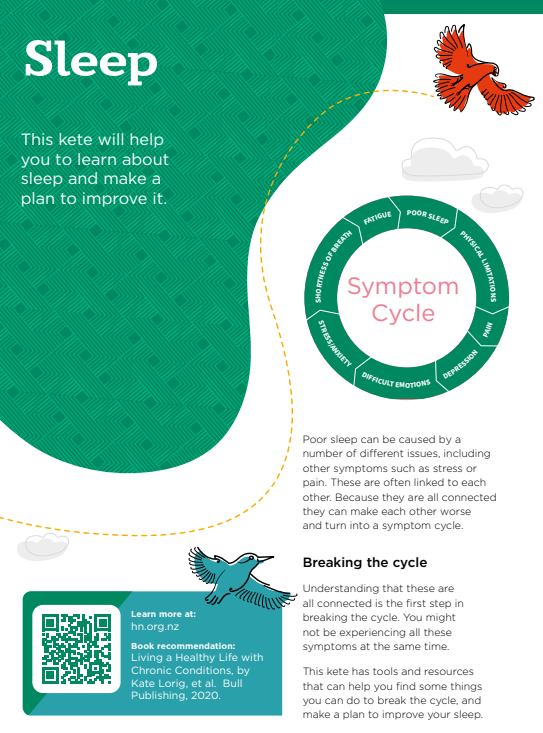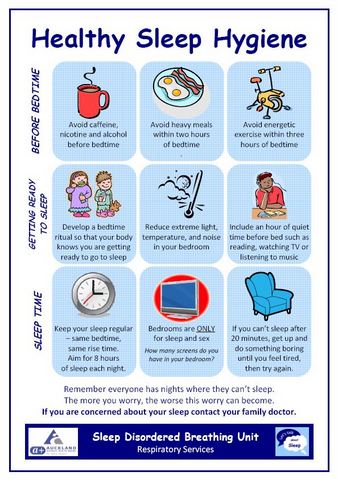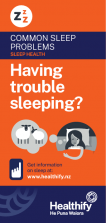Sleep tips
Helping you to sleep better
Key points about tips for improving your sleep
- Everyone knows they feel better after a good night's sleep. But for some, sleep does not come easily.
- The good news is there are things you can do to improve your sleep.
- Adopting healthy habits and behaviours and changing environmental factors to help you have a good night’s sleep is often called 'sleep hygiene’ .
- Improved sleep won't happen as soon as changes are made. But if good sleep habits are maintained, sleep will certainly get better.
- Here are some tips to help.

VIDEO: Sleep tips
Try to go bed and get up at the same time each day, including weekends
- Your internal body clock and hormones that control sleepiness and wakefulness work best when you have a regular sleep routine.
- Even if you've had a disturbed night's sleep, keep your daytime routine the same. Try going to bed and getting up at about the same time each day, including weekends.
- If you really need to catch up on sleep, it's better to go to bed earlier than normal and still get up at the same time as normal.
- Get out in bright light as soon as you wake up – light is the best regulator of your biological clock.
Go to bed when you're tired
- If you go to bed at the same time each night, you should start to feel sleepy at bedtime.
- Try not to ignore this sleepy feeling by staying up, as this is your window of opportunity for sleep.
- If you have things on your mind, try scheduling 'worry time' during the day – write worries down, then let them go.
Get up again if you can't go to sleep
- If you can’t sleep after 20 minutes or so, get up and do something relaxing but not screen-based.
- When you feel too sleepy to keep your eyes open, try to sleep again.
- Don’t lie in bed getting frustrated.
It may be helpful to keep a sleep diary
It may be helpful to keep a sleep diary to keep track of how well you're sleeping and identify factors that might be helping or hurting your sleep. If you're testing out a new sleep schedule or other lifestyle changes, your sleep diary can help document how well it's working. To learn more, see sleep tips tracker [PDF, 126 KB].
Regular daytime exercise improves sleep because it helps to regulate your body’s natural sleep-wake cycle.
- Morning walks and daylight are a great way to start the day feeling refreshed.
- Moderate to vigorous exercise can increase sleep quality by reducing the time it takes to fall asleep and decrease the amount of time lying awake during the night.
- You should base your exercise times and intensity on what best suits your sleep schedule but avoid vigorous workouts close to bedtime. Try more relaxing exercises like yoga, light stretching, and breathing exercises.
For most people short naps (short sleeps) generally don't affect your sleep at night but for some, napping at the wrong time of day or for too long can cause problems. Eg, if you have insomnia or poor sleep at night, napping during the day might make this worse. Long or frequent daytime naps might interfere with your sleep at night.
Here are a few tips to get the most out of a nap without affecting your sleep:
- Take naps in the early afternoon. Most sleep experts recommend napping no later than 2pm. Napping in the late afternoon may affect your ability to fall asleep at a reasonable time later that night, and could disrupt your night-time sleep.
- Keep naps short. Aim to nap for only 10 to 20 minutes. The longer you nap, the more likely you are to feel sleepy afterward. However, young adults might be able to manage longer naps. You can limit the time of your nap by setting an alarm.
- Create a restful environment. Nap in a quiet, dark place with a comfortable room temperature and few distractions. Consider wearing an eye mask and earplugs.
After napping, give yourself time to wake up before starting any activities.
What you eat and drink affects your sleep — consuming certain foods and drinks close to bedtime can lead to poor sleep.
- Caffeine can add a burst of energy to your morning, but it's not so helpful when you're trying to go to sleep. Drinking caffeine late can disrupt your sleep because it's a stimulant, meant to keep you alert. It's important to be aware that caffeine can be hidden in other foods such as tea, chocolate, soft drinks and even ice cream, so check the ingredients. Limit your caffeine intake to no more than about 300 mg to 400 mg per day. This is about 3–4 cups of coffee. Avoid caffeine in the late afternoon and in the evening. Read more about sleep and caffeine.
- Alcohol: Some people have alcohol before bedtime thinking it will make them feel sleepy; however, it can have the opposite effect. How alcohol affects sleep depends on the person, the amount of alcohol, the time it's taken and how quickly it's consumed. Drinking alcohol disturbs our brain rhythms and stops us getting enough of the deep sleep we need to feel rested and refreshed in the morning. To reduce the risk of sleep disruptions, you should stop drinking alcohol at least 4 hours before bedtime.
Read more about how food and drink affects sleep.
Blue light has a short wavelength that affects levels of melatonin (a hormone that regulates the sleep–wake cycle) more than any other wavelength does. This disrupts your body clock, causing poor sleep. Blue light sources include smartphones, tablets, computer screens, LED TVs and fluorescent light.
- If you use your phone or computer in the evening, switch it to night-time setting or, better still, turn it off.
- Use dim red lights for night lights – red light is the least able to affect your melatonin and change your body clock.
- If you work a night shift or use a lot of electronic devices at night, consider wearing blue-blocking glasses or installing an app that filters the blue/green wavelength at night. Read more about sleep and shift work.
Video: How blue light affects us in Aotearoa
This video may take a few moments to load.
(Royal Society, NZ, 2018)
Taking the time to relax and unwind before bed has been shown to improve sleep quality. It helps you destress and sends signals to your body and mind that daytime activities are over and it's time to prepare for sleep.
- Include an hour of quiet time before bed such as reading, having a bath or listening to music.
- Have a light snack before going to bed. Going to bed hungry can be distracting but avoid heavy meals within 2 hours of bedtime as this can interrupt sleep.
- Drinking a warm glass of milk before bed may be helpful – milk has tryptophan in it, which acts as a natural sleep inducer. Read more about how food and drink affect sleep.
Your environment can affect your ability to fall and stay asleep.
- Make sure you have curtains or blinds that are thick enough to keep out the light.
- Try to have the room at a good temperature, slightly cool is best.
- Make sure your bed is warm but don't leave the electric blanket on if you have one.
- Have a good supportive mattress and pillows.
- Change the sheets and pillow cases regularly as a fresh bed is more inviting.
- Bedrooms are for sex and sleeping so don't have a TV there.
Try to resolve your worries or concerns before bedtime. If you often lie awake worrying, set aside time before bed to make a to-do list for the next day – this can be a good way to put your mind at rest.
If you have ongoing sleep problems, using techniques like cognitive behavioural therapy (CBT) can help you understand and change the thoughts, feelings, and behaviours that cause sleep problems or make them worse.
Sometimes ongoing sleep problems themselves can make you feel anxious around bedtime and cause worry about falling asleep. CBT can help to change inaccurate or unhelpful thoughts about sleep.
Controlled breathing can help you feel more relaxed, and might give you a greater sense of control over your stress or anxiety. Read more about controlled breathing.(external link) (This resource is in English but other languages are available below in 'More information'.)
Try using a sleep app
There are a variety of mobile apps available for use on your smartphone or tablet that can be helpful if you have sleep problems.
- CBT-based apps can help you understand and change the thoughts, feelings, and behaviours that are contributing to insomnia.
- Some apps enable you to track your sleep habits, similar to a sleep diary, and help you develop good sleep routines. Others try to assist you to fall asleep by using calming visual graphics and relaxing music.
- Learn more about sleep apps.
If you have ongoing trouble sleeping, contact your healthcare provider if:
- your symptoms last longer than a few weeks or interfere with your ability to function
- your sleep partner tells you that you snore or gasp loudly during the evening
- you're taking a new medicine you suspect is interrupting your sleep
- you feel excessively sleepy or tired during the day, even if you slept for 7 hours the night before
- your sleep partner has told you that you seem to sleepwalk, act out your dreams, or otherwise make abnormal movements during the night.
If you have any trouble getting to sleep, or staying asleep, take our Twenty Winks Sleep Questionnaire to get personalised information about how to improve your sleep quality.
There are 20 questions about your sleep habits, lifestyle and health.
After you've completed the questionnaire you'll get a set of recommendations and links to information based on your answers.
How much sleep do I need?
Common sleep problems
Sleep apps
How shift work affects your sleep
The importance of sleep
How does food and drink affect your sleep?
Insomnia | Rarunga moe
How does sleep affect mental wellbeing?
Te Kete Haerenga – sleep
Te Kete Haerenga – sleep tips tracker [PDF, 137 KB]
Twenty Winks Sleep Questionnaire
Apps to help with sleeping Healthify He Puna Waiora, NZ
Te Kete Haerenga – sleep Healthify He Puna Waiora, NZ
Te Kete Haerenga – sleep tips tracker [PDF, 137 KB] Healthify He Puna Waiora, NZ
Te Hikuwai resources for wellbeing – sleep/moe(external link) Te Pou, NZ, 2022
Children – sleep for kids (external link) National Sleep Foundation (NSF), US
Tips for getting a good night's sleep(external link) Here to Help Canada
Good sleep habits(external link) Sleep Health Foundation, Australia
Sleeping problems – an NHS self help guide(external link) NHS, UK
Brochures
Note: These resources are from overseas so some details may be different in New Zealand, eg, phone 111 for emergencies or, if it’s not an emergency, freephone Healthline 0800 611 116:
What you can do to sleep better – bilingual information(external link) Health Information Translations, US, 2020
English(external link), Arabic(external link), Chinese (simplified)(external link), Chinese (traditional)(external link), French(external link), Hindi(external link), Japanese(external link), Korean(external link), Nepali(external link), Russian(external link), Somali(external link), Spanish(external link), Vietnamese(external link)
(external link)Controlled breathing(external link) This Way Up, New South Wales Multicultural Health Communication Service, Australia English(external link), Arabic(external link), Chinese (simplified)(external link), Chinese (traditional)(external link), Filipino(external link), Greek(external link), Hindi(external link), Italian(external link), Korean(external link), Spanish(external link), Vietnamese(external link)
(external link)Progressive muscle relaxation(external link) This Way Up, New South Wales Multicultural Health Communication Service, Australia English(external link), Arabic(external link), Chinese (simplified)(external link), Chinese (traditional)(external link), Filipino(external link), Greek(external link), Hindi(external link), Italian(external link), Korean(external link), Spanish(external link), Vietnamese(external link)
References
- Sleep problems(external link) Hauora: Māori Standards of Health IV, Otago University, NZ
- Blue light has a dark side(external link) Harvard Health Publishing, US, 2018
- Blue light and light emitting diodes (LEDs)(external link) Health New Zealand | Te Whatu Ora, 2024
- Te Kete Haerenga – sleep Healthify He Puna Waiora, NZ, 2022
Brochures

Healthify He Puna Waiora, 2022

Auckland DHB, NZ

Healthify He Puna Waiora and Mediboard, 2023
Credits: Healthify Editorial Team. Healthify is brought to you by Health Navigator Charitable Trust.
Last reviewed:





